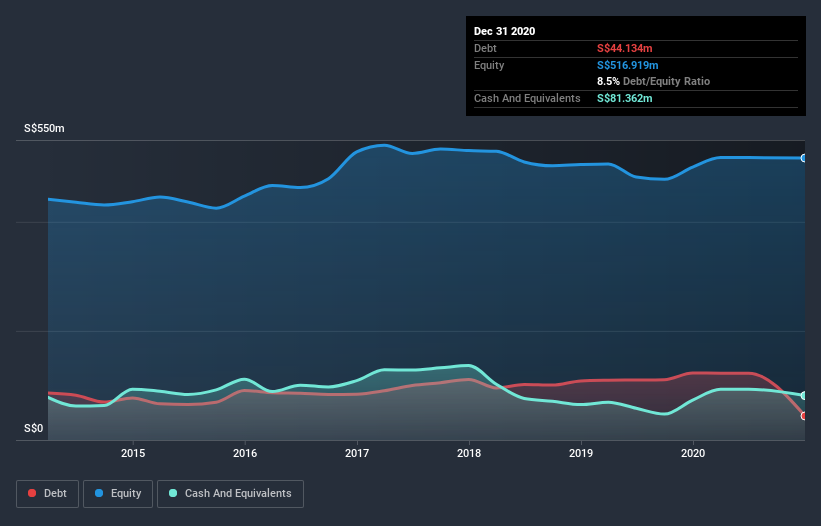
Warren Buffett famously said, 'Volatility is far from synonymous with risk.' So it might be obvious that you need to consider debt, when you think about how risky any given stock is, because too much debt can sink a company. We note that QAF Limited (SGX:Q01) does have debt on its balance sheet. But should shareholders be worried about its use of debt?
When Is Debt Dangerous?
Debt assists a business until the business has trouble paying it off, either with new capital or with free cash flow. Part and parcel of capitalism is the process of 'creative destruction' where failed businesses are mercilessly liquidated by their bankers. However, a more common (but still painful) scenario is that it has to raise new equity capital at a low price, thus permanently diluting shareholders. Of course, the upside of debt is that it often represents cheap capital, especially when it replaces dilution in a company with the ability to reinvest at high rates of return. The first step when considering a company's debt levels is to consider its cash and debt together.
View our latest analysis for QAF
What Is QAF's Net Debt?
You can click the graphic below for the historical numbers, but it shows that QAF had S$44.1m of debt in December 2020, down from S$122.8m, one year before. But it also has S$81.4m in cash to offset that, meaning it has S$37.2m net cash.

A Look At QAF's Liabilities
According to the last reported balance sheet, QAF had liabilities of S$276.2m due within 12 months, and liabilities of S$75.0m due beyond 12 months. Offsetting this, it had S$81.4m in cash and S$99.6m in receivables that were due within 12 months. So its liabilities total S$170.2m more than the combination of its cash and short-term receivables.
QAF has a market capitalization of S$566.6m, so it could very likely raise cash to ameliorate its balance sheet, if the need arose. However, it is still worthwhile taking a close look at its ability to pay off debt. While it does have liabilities worth noting, QAF also has more cash than debt, so we're pretty confident it can manage its debt safely.
On top of that, QAF grew its EBIT by 43% over the last twelve months, and that growth will make it easier to handle its debt. There's no doubt that we learn most about debt from the balance sheet. But it is QAF's earnings that will influence how the balance sheet holds up in the future. So if you're keen to discover more about its earnings, it might be worth checking out this graph of its long term earnings trend.
Finally, a business needs free cash flow to pay off debt; accounting profits just don't cut it. QAF may have net cash on the balance sheet, but it is still interesting to look at how well the business converts its earnings before interest and tax (EBIT) to free cash flow, because that will influence both its need for, and its capacity to manage debt. In the last three years, QAF's free cash flow amounted to 41% of its EBIT, less than we'd expect. That's not great, when it comes to paying down debt.
Summing up
While QAF does have more liabilities than liquid assets, it also has net cash of S$37.2m. And we liked the look of last year's 43% year-on-year EBIT growth. So we don't have any problem with QAF's use of debt. The balance sheet is clearly the area to focus on when you are analysing debt. But ultimately, every company can contain risks that exist outside of the balance sheet. For example QAF has 2 warning signs (and 1 which makes us a bit uncomfortable) we think you should know about.
Of course, if you're the type of investor who prefers buying stocks without the burden of debt, then don't hesitate to discover our exclusive list of net cash growth stocks, today.
When trading QAF or any other investment, use the platform considered by many to be the Professional's Gateway to the Worlds Market, Interactive Brokers. You get the lowest-cost* trading on stocks, options, futures, forex, bonds and funds worldwide from a single integrated account. Promoted
Valuation is complex, but we're here to simplify it.
Discover if QAF might be undervalued or overvalued with our detailed analysis, featuring fair value estimates, potential risks, dividends, insider trades, and its financial condition.
Access Free AnalysisThis article by Simply Wall St is general in nature. It does not constitute a recommendation to buy or sell any stock, and does not take account of your objectives, or your financial situation. We aim to bring you long-term focused analysis driven by fundamental data. Note that our analysis may not factor in the latest price-sensitive company announcements or qualitative material. Simply Wall St has no position in any stocks mentioned.
*Interactive Brokers Rated Lowest Cost Broker by StockBrokers.com Annual Online Review 2020
Have feedback on this article? Concerned about the content? Get in touch with us directly. Alternatively, email editorial-team (at) simplywallst.com.
About SGX:Q01
QAF
An investment holding company, engages in the manufacture and distribution of bread, bakery, and confectionery products in Singapore, Australia, the Philippines, Malaysia, and internationally.
Flawless balance sheet with solid track record and pays a dividend.


